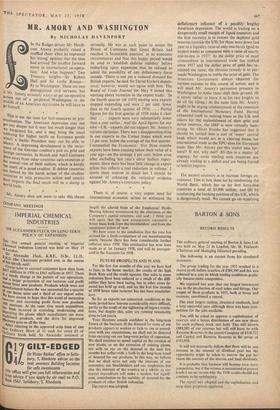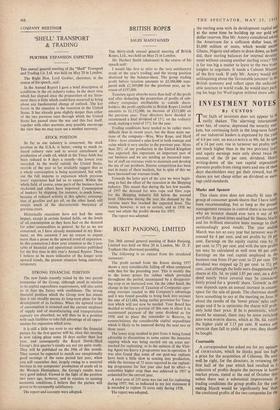MR. AMORY AND WASHINGTON
By NICHOLAS DAVENPORT
IN the Budget debate Mr. Heath- coat Amory probably raised a muffled cheer when he expressed his 'strong' opinion that the time had arrived for another forward move in international co-opera- tion.' And what happens? Two Treasury knights—Sir Robert Hall and Sir Leslie Rowan— fly to Washington. These are two
distinguished civil servants, but it Mr. Amory seriously wants to get co-operative action out of a perplexed Washington in the middle of an American depression he will have to go himself.
their imports the final result will be a slump in World trade.
*
Mr. Amory does not seem to take this threat C"PANY MEETINGS seriously. He was at such pains to assure the House of Commons that Great Britain had reached 'a favourable juncture' in its economic circumstances and that this happy period would be used to 'establish definite stability' before embarking upon expansion that he refused to admit the possibility of any deflationary force outside. 'There is not yet a reduced demand for British exports,' he said. Sir David Eccles's depart- ment, however, would not agree with him. The Board of Trade Journal for May 9 issued this warning about recession in the export trade : 'In the fourth quarter [of 1957] sterling area exports stopped expanding and were 2 per cent. lower than in the fourth quarter of 1956. . . . Partial figures for the first quarter of 1958 make it clear that . . . exports were very substantially lower than a year earlier,' And the April figures for our own—UK--exports did not support Mr. Amory's curious optimism. There was a disappointing drop in our exports to the United States which were 13 per cent. below the average of the first quarter. Commented the Economist: 'For three months exports have been running below their value of a year ago—on the average 4 per cent. below even after excluding last year's silver bullion repay- ments. Since there has been little change in export prices this reflects a real reduction in volume.' I quote these sources in detail lest I should be accused of colouring the statistical evidence against Mr. Amory's restrictive policy.
There is, of course, a very urgent need for international economic action to withstand the
deflationary influence of a possibly lengthy American depression. The world is trading on a dangerously small margin of liquid resources and the first necessity is to restore the depleted gold reserves (outside the US), for these were down last year to a liquidity ratio of only one-to-six (gold to import trade) as compared with a ratio of nearly one-to-one in 1937! As the dollar price of most commodities in international trade has trebled since 1937 and the dollar price of gold has re- mained the same, the obvious remedy is to per- suade Washington to treble the price of gold. The American Government always objected for various reasons to this course of action, and it will need Mr. Amory's persuasive presence in Washington to make them shift their ground. (It is surely unfair to leave it to his two knights to do all the tilting.) At the same time Mr. Amory ought to be urging reinforcement of the resources of the International Monetary Fund. Having exhausted itself in making loans to the UK and others for the replenishment of their gold and dollar reserves, the IMF is now virtually ham- strung. Sir Oliver Franks has suggested that it should be turned into a sort of 'super' central bank which would act as a clearing house for international trade as the EPU does for European trade. Has Mr. Amory put this useful idea for- ward? If not, why not? All this is a matter of urgency, for some sterling area countries are already trading at a deficit and are being forced to restrict imports.
* *
The second necessity is to increase foreign in- vestment. This is best done (a) by reinforcing the World Bank, which has so far lent forty-five countries a total of $3,000 milion; and (b) by reinforcing the banking position of the UK, which is dangerously weak. We cannot go on supplying the sterling area with its development capital and at the same time be building up our gold and dollar reserves. Has Mr. Amory considered as/014i the Americans for a sufficient dollar loan, sag; $1,000 million or more, which would enakb Ghana, Nigeria and others to draw down, as India did, their sterling balances for internal develop' mein without causing another sterling crisis? This is far too big a matter to leave to the two trusty knights to negotiate. It needs a Cabinet Minister of the first rank. If only Mr. Amory would slot soliloquising about the 'favourable juncture' in the British economy and reflect upon the unfavour' able juncture in world trade, he would start pack' ing his bags for Washington without more ado.



































 Previous page
Previous page